|
I come here when I have a little time, sometimes late in the evening or very early in the morning. I do a lot of focussed thinking when I am tilling the soil and while I am planting.
Since coming into office I've created and kept a kitchen garden at the Prime Minister's official residence in St. Anns.
0 Comments
rinidad and Tobago once again becomes centre stage for one of the world’s oldest creatures, the Leatherback turtle, as they return to our shores to nest. Turtle conservation group Nature Seekers recently shared photos of a female Leatherback turtle which came ashore to Matura Beach to lay her eggs. T&T is known as one of the largest leatherback nesting sites in the world, and the country’s conservation efforts for the endangered creature has been shown on international news agencies such as National Geographic and Blue Planet. Turtle watching season begins in Trinidad and Tobago from March 1 to August 30 and a permit is required for viewing these endangered animals, which were designated as Environmentally Sensitive Species (ESS) and are protected by law. Sightseers are warned that the turtle nesting sites on Matura and Fishing Pond beaches, and part of the Grande Riviere beach, are prohibited areas during turtle nesting season (March 1-August 30) under the Forests Act. It is also illegal to disturb turtle nesting grounds or affect the environment in any way which would harm turtle habitats. The Leatherback turtle, Loggerhead turtle, Hawksbill turtle and Olive Ridley turtle are all designated as Environmentally Sensitive Species. To see Leatherback turtles, one can apply for a permit via the Forestry Division or contact turtle conservation group Nature Seekers. Leatherback turtle numbers dropping due to bycatch Regulations under the Fisheries Act mandate that each commercial shrimp trawling vessel should have a Turtle Excluder Device as well as the specifications for the device, to ensure that turtles can escape if caught in nets. However Nature Seekers chairman Kyle Mitchell said in a 2018 interview with Loop News that the number of turtles nesting on Trinidad and Tobago’s shores was dropping, and the probable cause was bycatch. Turtles often get caught in fishing nets while coming ashore to nest, getting trapped below the water where they suffocate and die. TEDs are to be installed to allow turtles to escape the nets, if caught. Poachers caught with Leatherback turtles or anyone ill-treating a Leatherback turtle faces two years jail time and a fine of up to $100,000, under the Conservation of Wildlife Act About Leatherback turtles
Leatherbacks are the largest of all living turtles and have been in existence for approximately 100 million years. They can weigh up to 2000lbs and 10feet in length, but more commonly average 5-7 feet and 1000 lbs. They are found in all the world’s oceans. Leatherbacks come from as far as Africa, Canada and the UK to nest on local beaches. The most important nesting sites in Trinidad are Matura Bay, Fishing Pond, and Grande Riviere and Turtle Beach in Tobago. Their greatest threat worldwide is the commercial fishing industry, especially the practices of long lining and drift netting. IMANI BISHOP, 14, of St Joseph Convent, Port of Spain, has been congratulated by the National League for Nursing (NLN) based in Washington DC, for her recent study of how the covid19 pandemic has brought about a new respect for front-line health workers such as nurses.
Her online survey has been posted on the league's website at its Coronavirus Resource Centre. NLN chief program officer Janice G. Brewington, PhD, in an e-mail to the pupil's parents Richard and Wendy Bishop, said, "We applaud Imani for her or her excellent work." Founded in 1893 as the American Society of Superintendents of Training Schools for Nurses, the NLN was the first nursing organization in the United States. Bishop's findings indicate a leap in interest in front-line health workers over the period of the pandemic. Some 80 people were polled, of whom 35 replied. They were asked, "Did you gain an interest in front-line workers due to the work they performed during the fight against the coronavirus disease?" Some 51 per cent of respondents said they had an interest before the pandemic, while 49 per cent did not. However, some 94 per cent of respondents said that during the pandemic they gained an interest in the work of front-line workers, with just six per cent saying no. Bishop called for TT to have a national day of recognition for nurses. She said she initially had no interest in the work of these workers, but had changed her mind of seeing their heroic efforts worldwide. "Their selflessness would be kept extremely close to my heart, forever. "For this altruistic act, I am proposing that, we, as nations, set a day, before the end of this year, to recognise these courageous workers, citizens, as we wait for a vaccine to be developed." She hoped it would be celebrated every year. "Continuously fighting this uphill battle against the invisible enemy, the coronavirus disease, which seems unbeatable for now, are these caring, dedicated front-line workers. "I hope that the entire nation agrees with this view and a motion is passed to have a day of recognition for these selfless citizens." Bishop also represented TT at the Carifta Triathlon in 2017, 2018 and 2019. Source: Newsday, May 18, 2020 Plans to reopen the Trinidadian economy could soon be put into full swing as the twin-island Caribbean country reports 108 recoveries and zero active cases of COVID-19. (Photo: GoTrinidadandTobago.com) Twin-island republic of Trinidad and Tobago, with its last recovery, is now among eight Caribbean countries that have brought active cases of the novel coronavirus (COVID-19) to zero.
As at 1:52 pm Greenwich Meridian Time (GMT) on Friday, May 22, some 21,630 cases have been confirmed across the region. Of that number, 10,372 patients have recovered and been released, while 793 persons have died. The other seven members of the Caribbean’s elite ‘coronavirus-free’ club are St Kitts, Dominica, Monserrat, Anguilla, Belize, St Lucia, and Saint-Barthélemy. See the latest situational analysis on COVID-19 in the Caribbean below:Dominican Republic: 254 new cases; 13,657 confirmed. 448 patients have died. (7,366 patients have recovered) Puerto Rico: 117 new cases; 3,030 confirmed. 126 patients have died. (*No information available on recoveries) Cuba: Eight new cases; 1,916 confirmed. 81 patients have died. (1,631 recoveries) Haiti: 71 new cases; 734 confirmed. 25 patients have died. (21 recoveries) Jamaica: Five new cases; 535 confirmed. Nine patients have died. (181 recoveries) French Guiana: 12 new cases; 249 confirmed. One patient has died. (137 recoveries) Martinique: No new cases; 192 confirmed. 14 patients have died. (91 recoveries) Guadeloupe: No new cases; 155 confirmed. 13 patients have died. (109 recoveries) Guyana: Two new cases; 127 confirmed. 10 patients have died. (57 recoveries) Bermuda: No new cases; 125 confirmed. Nine patients have died. (80 recoveries) Cayman Islands: Ten new cases; 121 confirmed. One patient has died. (55 recoveries) Aruba: No new cases; 101 confirmed. Three patients have died. (95 recoveries) The Bahamas: One new case; 97 confirmed. 11 patients have died. (44 recoveries) Barbados: No new cases; 90 confirmed. Seven patients have died. (70 recoveries) Sint Maarten: No new cases; 77 confirmed. 15 patients have died. (59 recoveries) US Virgin Islands: No new cases; 69 confirmed. Six patients have died. (61 recoveries) St Martin: No new cases; 40 confirmed. Three patients have died. (33 recoveries) Antigua and Barbuda: No new cases; 25 confirmed. Three patients have died. (19 recoveries) Grenada: No new cases; 22 confirmed. (17 recoveries) St Vincent and the Grenadines: One new case; 18 confirmed. (14 recoveries) Curaçao: No new cases; 16 confirmed. One patient has died. (14 recoveries) Turks & Caicos Islands: No new cases; 12 confirmed. One patient has died. (10 recoveries) Suriname: No new cases; 11 confirmed. One patient has died. (Nine recoveries) British Virgin Islands: No new cases; eight confirmed. One patient has died. (Six recoveries) Countries without active casesTrinidad and Tobago: No active cases; COVID-19 free. (Previously had 116 confirmed cases, eight patients died) St Kitts and Nevis: No active cases; COVID-19 free. (Previously had 15 confirmed cases) Dominica: No active cases; COVID-19 free. (Previously had 16 confirmed cases) Monserrat: No active cases; COVID-19 free. (Previously has 11 confirmed cases, one patient died) St Lucia: No active cases; COVID-19 free. (Previously had 18 confirmed cases) Belize: No active cases; COVID-19 free. (Previously had 18 confirmed cases, two patients died) Saint-Barthélemy: No active cases; COVID-19 free. (Previously had six confirmed cases) Anguilla: No active cases; COVID-19 free. (Previously had three confirmed cases) Source: Buzz Caribbean, May 2020 The University of the West Indies (UWI) will take part in a study designed by the World Health Organisation (WHO) in an effort to find methods to properly treat COVID-19.
All the university’s regional campuses, including Trinidad and Tobago, will be taking part. Speaking on the study at the Ministry of Health’s daily virtual health briefing, Professor Terrence Seemungal, Dean of the UWI Faculty of Medicine, explained that it’s set to be a comparative analysis of four drug treatments, including hydrochloroquine, and standard patient care. Standard care refers to the treatment of singular symptoms or the prescription of anti-biotics based on the patient’s individual needs. “Patients will be given the opportunity of enrolling in the study; of course, and they can say no and if they say yes, they will have to sign a consent form and further information will be given to them,” he said. The study calls for the enrollment of people who are already infected with COVID-19 to participate, but they will be relinquishing some measure of control. “If someone opts to go into the study, they cannot say which line of treatment they must get; it is, what we call, randomised and the randomisation process is done by the WHO,” he explained. Professor Seemungal says the intention is for scientists to be able to conclusively determine which of the drugs, if any at all, could be effective in treating COVID-19. Timelines for the study will range between seven to 14 days depending on which treatment the subject is given. The University’s ethics committee will have the last say on whether UWI does end up officially participating in the study. Source: The Loop 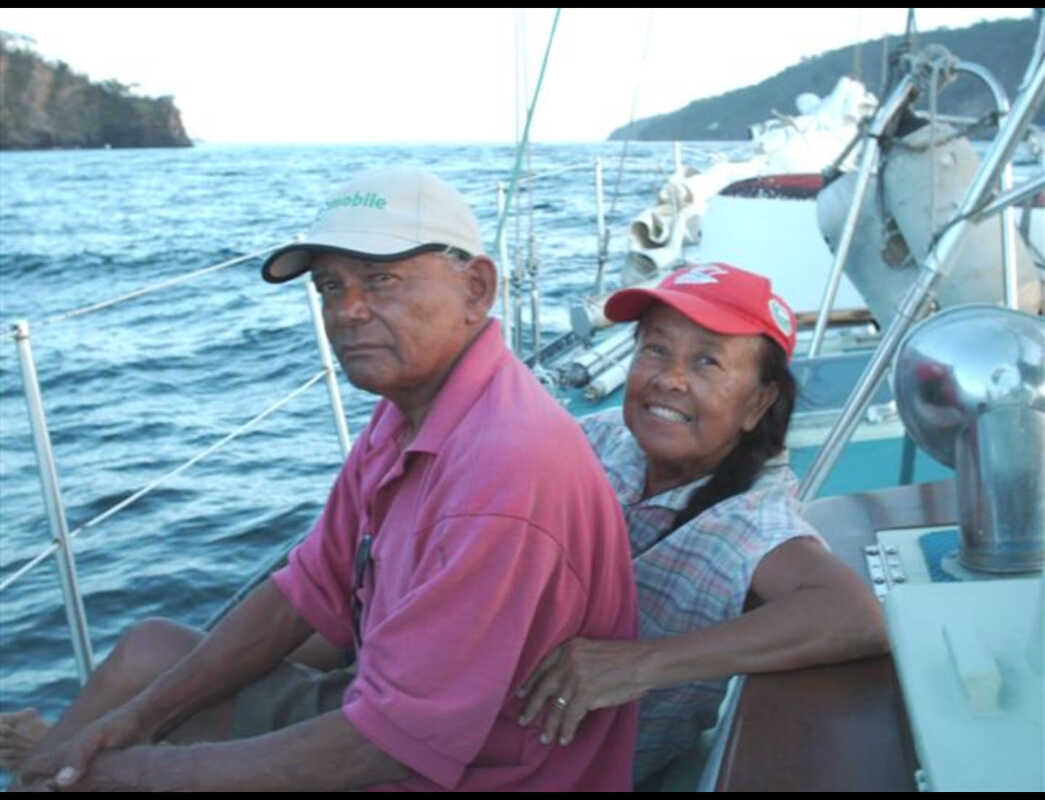 Harold La Borde was a Trinidadian sailor and adventurer[1] who from 1969 to 1973 circumnavigated the world in his 40-ft ketch Hummingbird II. He was accompanied by his wife, Kwailan, and his five-year-old son Pierre. As the first known Trinidadian sailors to cross the Atlantic and later to circumnavigate, Harold and Kwailan were awarded the nation's highest honour – the Gold Trinity Cross. Harold was born in Trinidad, West Indies, on June 18th 1933 (died June 2016), of parents with a rich mixture of blood in their veins – French, African, Spanish and Amerindian (Carib). He was educated at a local Roman Catholic school and began his sailing career by building dinghies, in which he taught himself the rudiments of seamanship, and reading any book about deep-sea sailing that he could lay his hands on. Harold La Borde was determined to get a suitable boat, opting to build one himself. In his first book, An Ocean to Ourselves (1962), La Borde tells how he built a 26-foot ketch Humming Bird. Harold and Kwailan, who were married in 1959, made their maiden voyage in the 26-foot vessel, Humming Bird, to England in 1960, together with a friend, Buck Wong Chong. The Humming Bird was subsequently sold, and says Harold "is somewhere in Europe." The La Bordes, always working as a team, took jobs at an Outward Bound school in Nigeria in 1961, after the voyage, but the call of the sea was too strong for the young couple and they returned to Trinidad in 1963, when they started to build the 40-foot ketch Humming Bird II. Their first-born son, Pierre, arrived while work was in progress. The boat was completed in three years and, after chartering her out to Americans for a further three years in order to raise sufficient funds, the family set out on 2 February 1969[2] on the, now historic, voyage that took them around the world. Harold and Kwailan were both awarded their nation's highest award, the Trinity Cross for their seafaring adventure. Their second son, Andre, was born in Auckland, New Zealand, during the voyage. Upon their return home, the 40-foot Humming Bird II was purchased by the Trinidad and Tobago Government in 1973, and can be seen in the museum near the lighthouse on South Quay; and according to Harold "is rotting away there. It is a sad thing, especially when you talk about taking care of historical things." The La Bordes went on to another circumnavigation voyage via Cape Horn (1984–86) in the Humming Bird III. Harold La Borde T.C. also wrote a further two books with input from his family, wife Kwailan and sons Pierre and André, All Oceans Blue (1977), and Lonely Oceans South (1987). Documentary films of their travels were made in conjunction with the Government Film Unit, which were also very professionally put together. After retiring from their respective jobs in Trinidad, the La Bordes ran a small family marina in Trinidad's busiest yachting bay. Harold's full-time job was working on the Humming Bird III, every day while Kwailan finished their autobiography which includes all of their sailing voyages to the present, entitled Wind, Sea, and Faith. Harold La Borde died on June 12, 2016, leaving behind his wife, sons Pierre and Andre, three grandchildren (Shannon, Arama, and Sanchia), and his brothers Rudy and Hugh. Source: Virtual Museum of TT, May 1, 2020 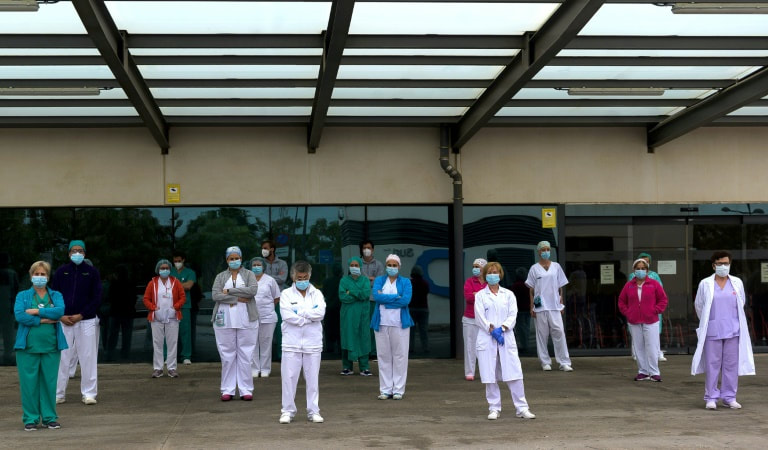 A team of Cuban nurses arrived in Trinidad and Tobago on Friday to assist this country with its COVID-19 efforts. Health Minister Terrence Deyalsingh made the announcement while speaking at the daily virtual media briefing on Saturday. He said the nurses will be quarantined for a 14-day period before they are deployed. "The Cuban team of nurses of 11 or 12 did in fact arrive yesterday (Friday). We are happy to welcome them to Trinidad and Tobago. As per protocol, they are going to be quarantined for a period of two weeks just to make sure, just like we did with the contingent from Barbados and Suriname," Deyalsingh said. The Health Minister added that they are Intensive Care Unit (ICU) nurses. He noted that there is a shortage of that skill in T&T and local nurses are being trained. "Once they get the all clear, then we will have them deployed where we need them. These nurses are specialist ICU nurses. In Trinidad and Tobago, we have a shortage of that skill. They are not taking the job of Trinidad nurses. What we are doing in the interim is also training our local nurses in ICU management." Meanwhile, the Ministry of Health said in its 4 pm clinical update on May 2, 2020, confirmed that the number of positive cases remains at 116, with eight deaths. To date, 1,838 samples have been submitted for testing, with 1,517 unique patient tests completed and 312 repeated tests. The Ministry said 88 people have been discharged to date, with one additional person discharged from the Home of Football in Couva. Currently, six patients are still at the Couva Hospital and there are no patients at Caura Hospital. The Ministry said there are no patients in ICU or HDU. Source: The Loop, May 3, 2020 Trinidad and Tobago is now listed at number one in an updated covid19 lockdown rollback checklist compiled by Oxford University researchers.
The report, the Oxford Covid19 Government Response Tracker (OxCGRT), was created by the University of Oxford's Blavatnik School of Goverment (BSG). The data is analysed by a team of researchers led by Dr Thomas Hale, associate professor of global public policy at BSG. It is a working paper, which means it is a non-peer-reviewed article. These are used for early drafts to gather feedback before they are submitted to academic journals. This country shares the lead with Croatia, Hong Kong and Iceland. The list which ranks countries that meet World Health Organization's recommendations for relaxing physical distancing measures. In a previous list issued on April 23, TT was ranked second to Vietnam. TT and nearly 160 other countries were graded in four areas: cases controlled; test, trace and isolate; manage import cases; and community understanding. This country has a score of one, the highest achievable, for control of cases, as well as community understanding, along with other high scores of 0.8 for testing and isolation, and 0.9 for community understanding. It gives the country a total score of 0.9. Croatia, Hong Kong and Iceland were ranked joint first with the same score. By comparison, the UK is languishing near to the bottom, only four places above Iran, which sits last. The UK's total score is 0.3, with the only respectable score being 0.9 in community understanding. The first published list not did not identify the countries' individual scores. Before ranking each country by scores, the document notes that while the publisher, Oxford Covid19 Government Response Tracker (OxCGRT), and its data cannot fully say how ready countries are to leave lockdown, it provides for a rough comparison across nations. "Even this 'high level' view reveals that few countries are close to meeting the WHO criteria for rolling back lock-down measures. At the time of writing, only a handful of countries are doing well at the four 'checklist' criteria OxCGRT is able to track," the report says. Hale's report used WHO guidelines as its basis. Minister of Health Terrence Deyalsingh, asked for his thoughts on TT's number-two position on Wednesday, said the population should not react with a false sense of security. He added, however, that the Oxford report is "a very good report" and "paints us in an excellent light." "This is testimony to what we have been saying all along," Deyalsingh said, "that our response to covid, led by the prime minister, was a robust one...What this speaks to is that the world is recognising that the decision not to flip a switch and open back the economy is the right way." Source: Newsday, May 1, 2020 The Health Minister and National Security Minister have been working together to get Cuban nurses into Trinidad and Tobago, to assist in fighting the COVID-19 pandemic. Minister of National Security, Stuart Young highlighted that it is anticipated that a plane will be coming from Cuba, in the very near future, to bring these nurses to our shores.
The Minister made it clear that these nurses would be quarantined for 14 days upon their arrival. Source: Power 102FM, April 2020 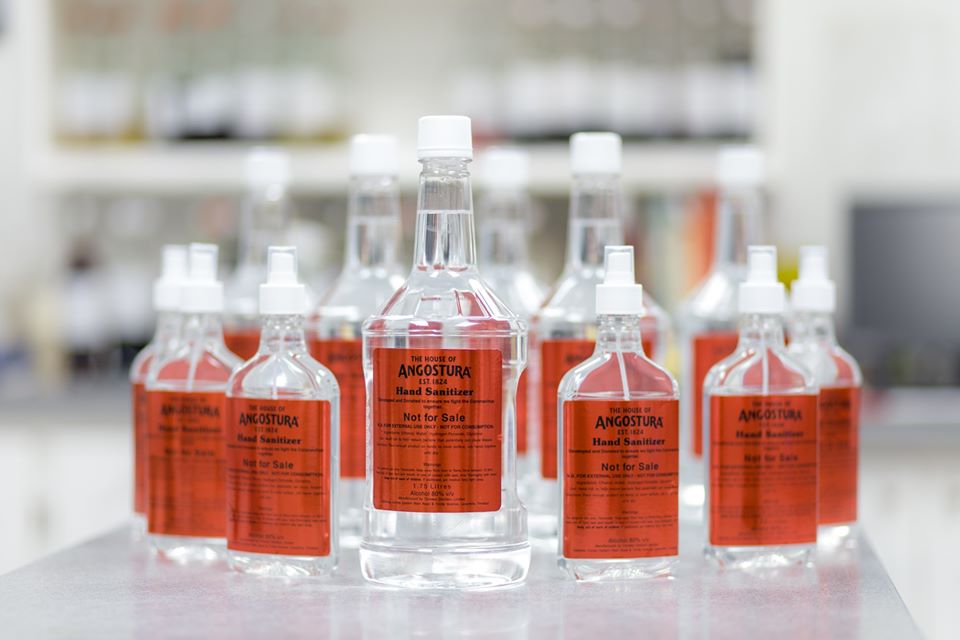 Port of Spain, Trinidad. April 3rd, 2020: The COVID-19 pandemic has brought global economies to its knees, with many grinding to a halt. It has crippled so many industries worldwide, particularly the food and beverage industry such as bars and restaurants, where millions of people around the world are now without a job, since bars have been forced to close their doors and restaurants have limited their businesses to pick-up services only. Most of the employees in these establishments have relied heavily on tips from customers to pay their bills to take care of their families. Their livelihood has now been uprooted by the outbreak of the coronavirus and it is anyone’s guess when normalcy will return. The food and beverage industry is an area that Angostura Holdings cares deeply about as it’s a sector that has continuously supported our business. To the healthcare workers and all other first responders around the world, thank you for taking care of everyone in your respective countries, and risking your lives daily to ensure that the coronavirus does not spread. Our employees, customers, suppliers, partners and communities are suffering due to this pandemic. As a corporate citizen of Trinidad & Tobago we cannot sit by and watch those who have supported us suffer at the hands of this dreaded coronavirus. It is our responsibility to do what we can to fight this virus from taking over our country. One of the products desperately needed at this time is hand sanitizer and, we are able to produce pharmaceutical grade alcohol to make it. Angostura has transformed its distilling capability to deliver all pharmaceutical demands while also producing 50,000 bottles of 375 ml and 20,000 bottles of 1.75 litres hand sanitizer to donate. As at April 1st, Angostura began distributing the hand sanitizer to public hospitals for healthcare workers, the Ministry of National Security for its first responders such as the Police Service, Defence Force, Prison Service in T&T, communities and other entities with direct public interaction. Our employees have been working tirelessly to ensure that we deliver the best quality of hand sanitizer. It comprises of 80% ethyl alcohol and small amounts of hydrogen peroxide and glycerin. It is made according to the World Health Organization’s (WHO) recommendations and formula. This is not the first time the Company has stepped in to give assistance to the nation. In fact, Angostura has a long history of supporting its communities, employees and partners, and this time around is no different. CEO Peter Sandstrom says, “We felt it was crucial to manufacture and donate hand sanitizer for frontline healthcare workers and other first responders. These are workers who are putting their lives on the line to combat the spread of COVID-19. It is important to us that they are protected from this virus. We, at Angostura, appreciate their sacrifices and we salute them for their contribution.” Sandstrom adds, “Angostura is a business built for people and by people. In times like these, it is essential, we deliver what the country needs. As an executive team, we took the decision to begin producing high-grade alcohol for sanitizing liquids to ensure that we could support the nation’s fight against the coronavirus, by preventing the spread of the virus with the very effective and powerful hand sanitizer. At a time when our plant was down, we have made modifications to increase, as far as we can, our alcohol production capacity. The excess alcohol though limited, has been distributed for sale to those licensed to produce hand sanitizers. Angostura is here to support the nation and we are making every effort to do this.” The company started a distillery upgrade back in December 2019, which is still underway and that has limited the amount of alcohol in our plant. Despite this, Mr. Sandstrom says, Angostura is committed to delivering what it takes to assist T&T. To say these are uncertain times is an understatement. We don’t know what lies ahead, but what we do know is that Angostura Holdings. will continue to play a role in fighting the spread of COVID-19 in T&T. As a global bitters and rum producer that has been around for over 195 years, know we will ride through this storm. COVID-19 is having a severe impact on all businesses. The coronavirus hit our country in mid-March when the first positive case was detected. Since then the number of positive cases has been climbing and this has led to a shutdown of many businesses, leaving thousands of people without jobs. We at Angostura have been able to sustain our operations so that we can maintain all our employees at this time, but this is being done through strict and stringent safety measures to protect everyone. While we have secured our personnel, we are constantly reviewing our supply chains to maintain business continuity. The Gov’t of T&T has closed off all international borders, thereby restricting entry, social gatherings have been prohibited, and social distancing is being encouraged in a bid to safeguard citizens from the dreaded virus that has taken over many other countries. The Government also took a decision to allow only essential services to operate for a two-week period, to ensure the amount of people leaving their homes is limited so that the coronavirus does not continue to spread. Together, we can all fight this and regain control of our lives and our beloved country. |
T&T news blogThe intent of this blog is to bring some news from home and other fun items. If you enjoy what you read, please leave us a comment.. Archives
June 2025
Categories
All
|



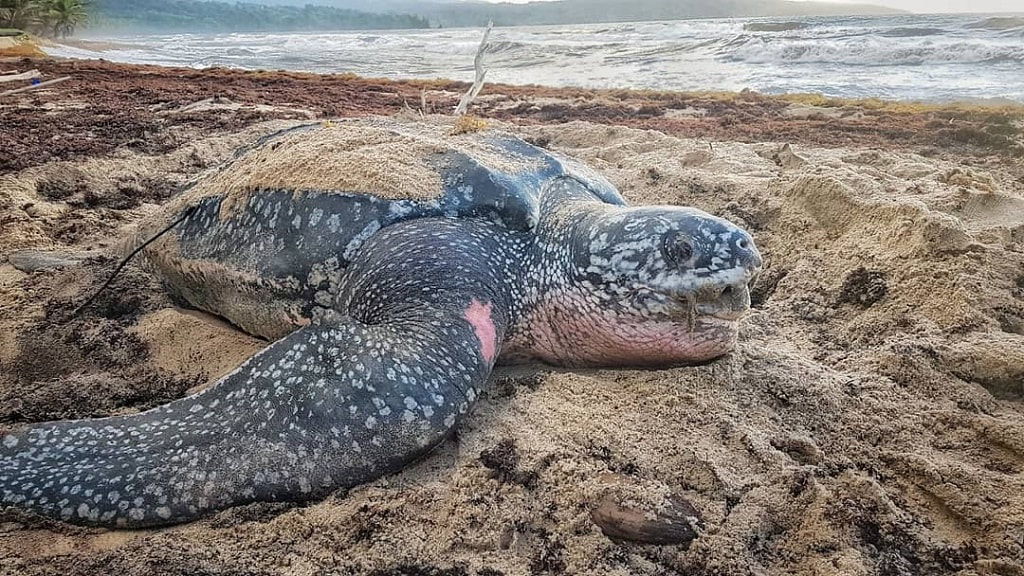

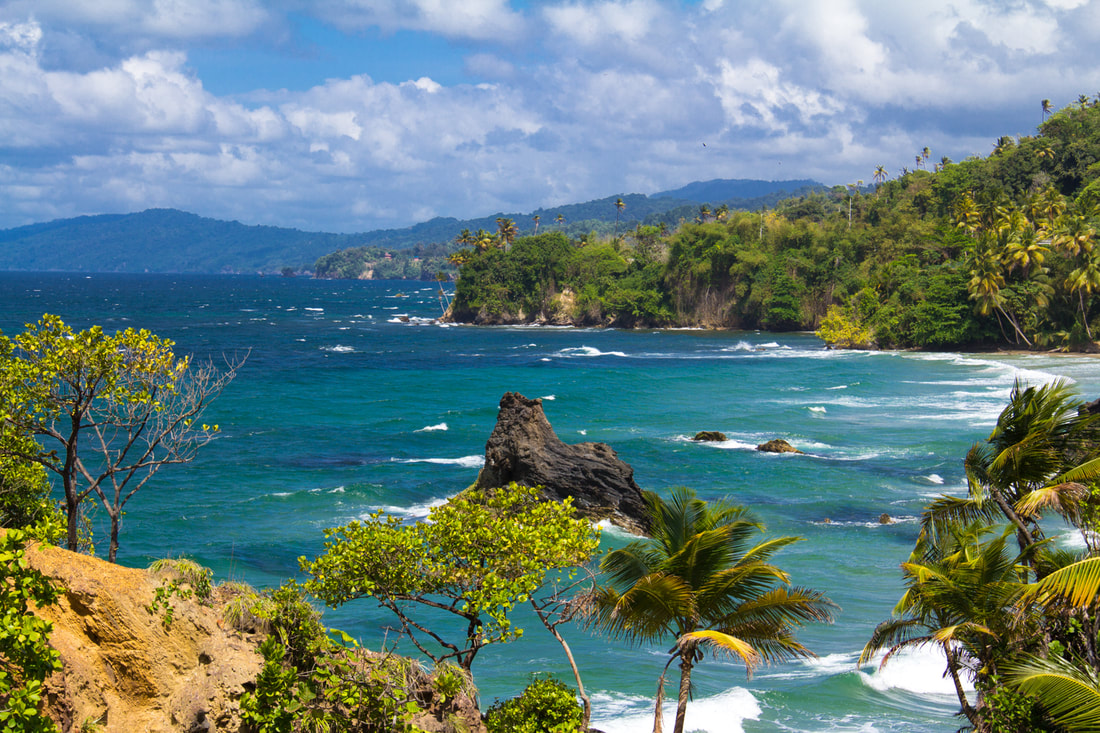
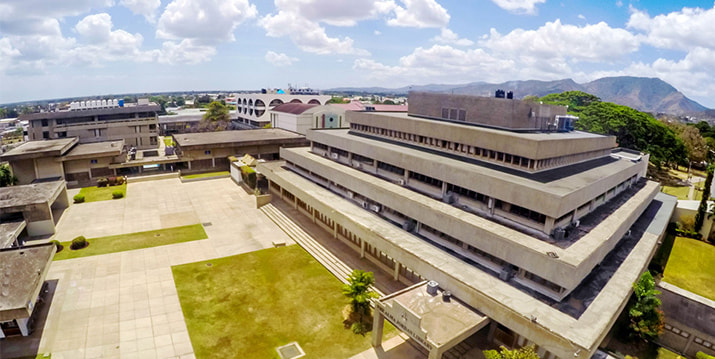
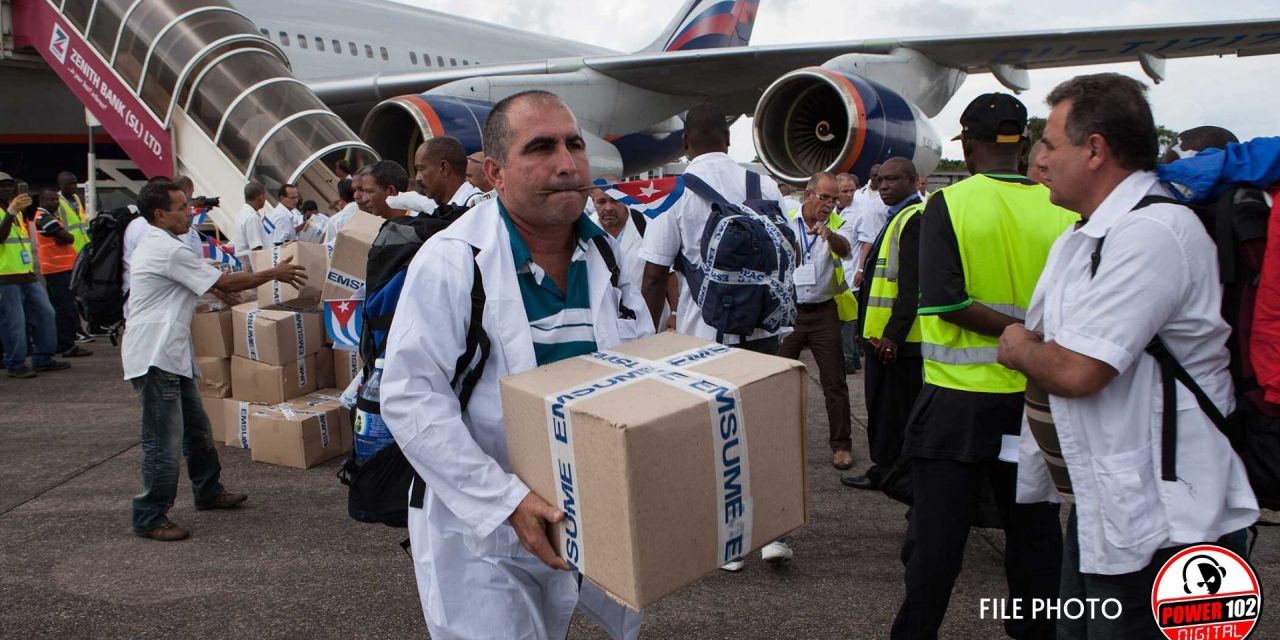

 RSS Feed
RSS Feed